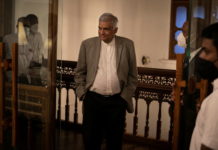Most people take the human brain’s ability to process and understand information for granted. Someone speaks a sentence, and the listener comprehends it and responds in a matter of seconds. For me, it is a much longer, more difficult procedure: I received a diagnosis in childhood of auditory and language-processing disorders and attention-deficit disorder. When people talk to me, I have to focus on every word spoken, replay it in my head, try to understand its meaning and then respond, hoping I didn’t miss too much information. My brain also goes in multiple directions at the same time, often causing me to lose my main train of thought. These challenges follow me in every part of my life, and they created special difficulties for me while at war.
I was not new to military life when I deployed. I had been raised on Long Island on stories of my uncle’s exploits in the army in Trinidad, where my family hailed from. When I was about 10, my mother took me to the base where my uncle was stationed. I had never met him, and he was away at the time, but visiting the garrison and hearing other soldiers’ stories about him was inspiring. I, too, wanted to wear a uniform and have that sense of pride that was obvious in the soldiers I met. I jumped into Air Force J.R.O.T.C. in high school, eager to learn more about life in uniform. I tried college as my parents wanted, but I also sought out a recruiter and enlisted in the Army Reserve. I earned my bachelor’s degree and went into active duty. Less than a year later, I was Iraq-bound. By the time of the shower incident, I’d been a soldier for almost seven years.
Because the Army was aware of my disabilities and had accepted me, trained me, advanced me and deployed me, I thought I was understood and welcomed. I’d expected active duty to feel more inclusive than the Reserves, like a real community. But my shower mistake was one of the many occasions when I had difficulties processing orders given by my superiors. Yelling and sounds of danger in the distance — fixtures of deployment life — tripped my fight-or-flight response, making it difficult to focus and execute a task. Often, I would be fumbling, trying to keep up with my peers, while also dealing with the embarrassment of knowing I lagged behind. It was clear that other soldiers were frustrated with my difficulties. No one said it, but it was written all over their faces: I was a burden.
My platoon sergeant treated me as if I was being deliberately insubordinate, but I was doing my best to fully understand my orders. I struggled to ask for clarifications or explanations; I feared angering him further. When I sought counseling from a base chaplain, my sergeant accused me of using those appointments to avoid work. He kept me on the worst work details, cleaning the mobile kitchen trailers and disposing of latrine waste. Everyone got stuck doing these tedious and dirty jobs at some point, but I felt I was assigned to them more often than even the most junior soldiers.
Source : Nytimes












